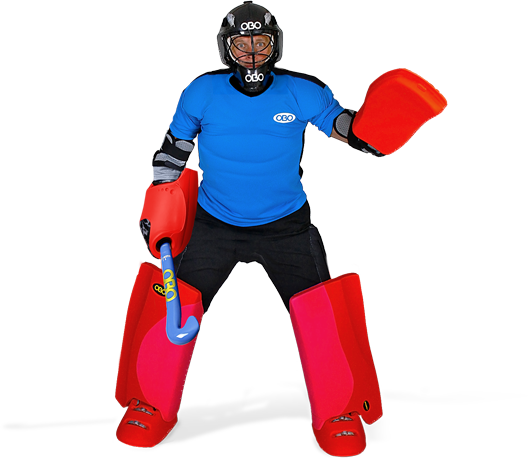KEEPERS RESOURCES

Staying mentally strong
You train twice as hard as everyone else, are expected to stop all of the 100+ shots blasted at you in training, get bruised black and blue, then go and be told you’re still not ready skill wise. If you make a mistake it can cost your team the game. When it comes to game time, you’re expected to pull off amazing dramatic saves at the drop of a button. You have to take bull in the form of pointless advice from team mates and comments from the opposition trying to get under your skin. Once you’ve done all that, you have to go back and do it all again.
Your role forces you to take on the responsibility of the team (something that can kill your ‘mojo’ if you let it get to you): if they are playing poorly, you have to ‘pick them up and carry them, making the big saves to keep them in it, and if you are down on the scoreboard a screw up can cost you the game. At the decisive development stage where you are a young keeper looking to develop into a no 1 at top domestic level, it’s back breaking work training hard twice a week and then playing at weekends. If you look at pro sport (and any other type), you’ll find out that the best players are those who have stuck with it and worked their way through to be the best in the world.

Mental strength
A goalkeeper stands against a tough mental battle, given the role of the task to ensure the team wins. In comparison to the other players, you can easily be everybody’s mug of the month. If a defender makes a mistake, you’re supposed to mop up after them, and if it isn’t a striker’s ‘week’, then it’s just put down to not being given the right scoring chances by their team mates. Being mentally strong is essential to any chance of achieving success. As you start to go up the ladder of hockey, you will come under intense pressure not only to succeed, but dominate, in a game where you won’t seem many shots in a defence orientated game. There are some keepers that will fail to take their game to the next level and progress in their development because of their inability to develop a mental ‘game’: don’t let that be you.
During a game, how you feel and how you look to the other team can affect the final outcome. If you start to show emotion and look beatable (getting wound up, which can cause you to make rash decisions like bad tackles), then the team will really start to test you and get as many shots as possible on goal to find your weak spots. Learning to grow a backbone to resist nasty comments and shake off mistakes will set you up for the ‘professional’ game, mentally able to beat off anything that comes your way.
Developing strength
As they always say, sport is 99% mental and 1% skill, not to mention the hard work needed to beat out your peers. In order to succeed at a high level, you need to have a solid mental ‘game’ as well, otherwise you won’t be able to play to your best. In the face of allowing costly goals that can affect your team’s chances (letting the lead slip), you need to be able to stand up and carry your team. If not, then you will crumble and end up giving away a defeat because of it; losing confidence as you get shelled by the opposition, and consequently your team losing faith in you. How you develop a strong mental character is more of a personal skill, as it is something that cannot necessarily be ‘taught’, you need to work out what works for you, and build up a system to resist negative thoughts.
Self belief
Goalkeeping is all about confidence, which relates to how you play; if you are playing confidently, then you will be able to compete at your best (regularly, week in week out), but if you aren’t happy with your game or the situation, the chances are you will play poorly; rethinking situations that would normally be easy to deal with and doubting yourself. If you are nervous, then you cannot perform at your best, and therefore let your team down. A confident keeper will make those unbelievable, amazing saves that deny the opposition’s best chances, whereas a shaky keeper will let in soft goals. It’s all about confidence: if you play confident, then you will succeed, but if you get upset with yourself, you will sink, costing your team.
Examples of encouraging yourself:
-
Wear the no.1 shirt: if you believe you’re the best, then you’re likely to go out and prove it
-
Build a video of ‘Hollywood’ saves and then watch it before the game to really psych yourself up
-
‘Roar like a tiger!’: it may sound stupid, but doing the clichéd trick of looking into a mirror and putting on your ‘game face’ can really help
-
Work out phrases to say in your head when training or playing (encouraging your self to perform)
-
Take pride in your ability; acknowledge something if it’s done well (i.e. making a timely save to keep the score even, or getting a clean sheet)
Tips
Learning to become mentally unbeatable, is a personal thing that varies for everyone, but in order to succeed, you do need to establish a strong mental game. Positive mentality will define whether or not your team succeeds; if you have a ‘mental collapse’ and get shell shocked, making yourself beatable as a result, then you have made the opposition’s job all too easy. Don’t: never give up and always fight no matter what; don’t make it easy for them to score on you . Leaning to shrug off goals and people’s comments will help you maintain consistency in your game, always being unbeatable.
Here are some ideas staying mentally strong in practice:
-
Focus on your game; don’t get phased by what’s going on around you – only you can , so concentrate on your
-
Don’t show emotion: don’t get harassed by players getting in your face or your own team stabbing your in the back – learn to ignore and use it as a motivational driving force – look weak and the opposition will think you are easy to beat
-
Never give up on your team; stay in the game no matter what to keep them in it, showing commitment and will help make the big saves when they really matter
-
Develop a thick skin; learn to ignore people’s comments and let mistakes wash off you like water off a duck’s back (make them the reason to perform better rather than having a negative impact); that way, you can really prove them wrong
Ultimately, you need to be strong in yourself and your own ability; it is your game and essentially your problem (if you’re having a bad spell), so you have to work out methods to help yourself.You truly have to believe in yourself: no-one else matters. If you can’t go onto the pitch thinking your God’s gift or the best around, then you will struggle to play to your best, doubting your own ability and letting your confidence slip.
Comments
Leave Your Comments Below
















































